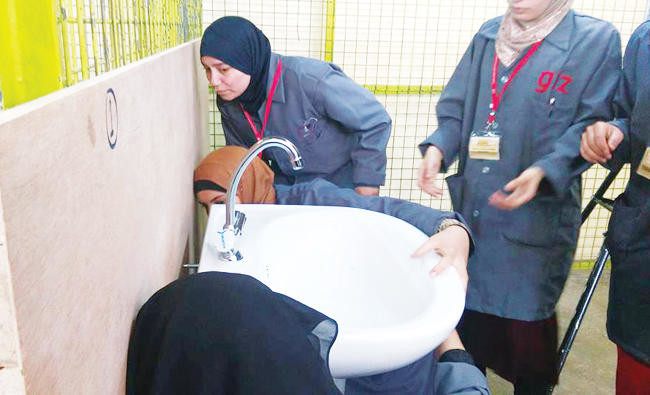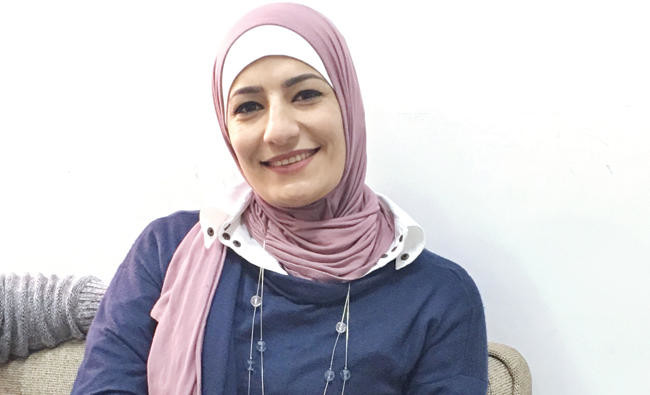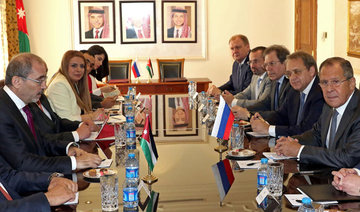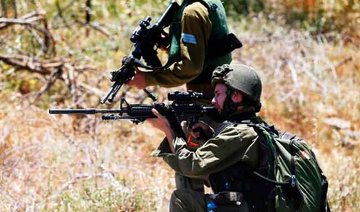LONDON: Israa Ababneh was skeptical when her uncle signed her up for a plumbing course at a vocational center in North Jordan.
“At first I thought what am I doing here? It’s just for men and it’s hard.”
But she stuck it out for three days and mastered the basics before moving onto practical skills.
“That’s when we started to have fun, learning how to cut iron pipes, connect them and fix leakages behind a wall.”
The 27-year-old is one of a growing number of women taking up plumbing in Jordan, raising eyebrows in local communities where social norms prevent many women from working, particularly in roles traditionally occupied by men.
Some 81 percent of women in Jordan are unemployed, according to a report by UNHCR.
The country ranks 134th out of 142 in terms of women’s economic contribution, according to a 2016 study by the Jordan Strategy Forum.
At first, Ababneh and the other female plumbers she works with found these patriarchal attitudes prohibitive — particularly when people refused them work because they were women.
“They used to laugh and say we couldn’t do it. It was like a challenge.”
Now, she said, clients call specifically seeking female plumbers.
“A man just mends the faucet and leaves a mess but when a woman does it she fixes the problem and leaves it clean.”
Women plumbers can also gain access that is off limits to men, carrying out work in households where male family members are not present.
This means leaks can be fixed faster with less water lost – a big benefit for a country where water availability is among the lowest in the world.
Jordan has an annual water supply of just 150 cubic meters per person, well below the official UN threshold for “absolute scarcity” set at 500 cubic meters.
“Water is a highly sensitive issue in Jordan,” said Bjorn Zimprich, project manager at German Development Agency GIZ, which initiated the Water Wise Women’s Initiative to train female plumbers in the country.
“There have been a lot of awareness campaigns and people know that water is scarce but with regards to behavioral impact there is limited impact.”
Most Jordanian households subsist on just one water tank a week so fixing a burst pipe quickly can make all the difference for families dependent on limited supplies.
With between 40 and 50 percent of Jordan’s water lost through its aging distribution network, due in large part to leakages and theft, there is an urgent need for more efficient maintenance.
Conservation is a key concern on the training program, which aims to raise awareness surrounding water scarcity among local and refugee communities across Jordan.
“People from Syria, Iraq and Palestine are all living in this country and sharing the water,” said Ababneh, pointing to the additional pressure on Jordan’s limited resources created by a refugee crisis.
“We go into schools and tell them how to stop leakages and advise households on using water-saving devices,” says Ababneh, who is now part of a professional female plumbing cooperative.
The women work in pairs, with different teams responding to calls around the country.
Plumber Ala Abu Heja, 32, hopes that this could help pave the way for more diversity in Jordan’s labor force.
“Before, a female plumber is not something people here would accept.
Now we’re seeing some females working in electricity, plumbing and mechanics so these initiatives will influence the entrance of women into other occupations traditionally dominated by men.”
More than 160 women have now graduated from the program, which runs separate sessions for male trainees.
Nargis Al-Mahmoud, 23, arrived in Jordan in 2013 after bombs destroyed her home in Dar’aa, Syria. With little means of generating an income in Jordan, her husband signed up for the course.
“He was really struggling to understand the theoretical part but reading his notebook one time I said, are you kidding? This is something I can do.”
The daughter of a handyman, Al-Mahmoud already knew her way around a toolbox and she enrolled in the program, eager to pursue a career in plumbing. “The first time I went to a house they started to make fun of me and I ran out crying. It was really bad. I told my husband and he said just stay at home, we don’t need this.
But Al-Mahmoud was determined to put her new skills to use. “I didn’t do all this training just to sit at home,” she said. After fixing a few things for free to showcase her skills, Al-Mahmoud’s client base began to grow and she is now working alongside her husband to expand their budding family business.
For Abu Heja, the opportunity to earn and contribute to the household budget has had a personal as well as a financial impact. “I now have a source of income and a greater sense of self-respect,” she said, a feeling shared by many graduates of the program. “In the past, we felt shy and restricted, but now we’re working, we feel we can go wherever we like and do what we want. It’s really built our confidence in a way that we never thought it would.”
Jordan’s women plumbers fix pipes as men leave puddles
Jordan’s women plumbers fix pipes as men leave puddles

Body of slain Syrian refugee boy in UK to be repatriated after fundraiser

- Ahmad Mamdouh Al-Ibrahim, 16, was stabbed to death in Huddersfield on April 3
- More than £15k raised by local community to support his family
LONDON: The body of a 16-year-old Syrian refugee who was stabbed to death in the UK is being repatriated to his homeland following a local community fundraiser, The Guardian reported on Tuesday.
Locals in Huddersfield raised more than £15,000 ($19,800) after the killing of Ahmad Mamdouh Al-Ibrahim, whose family described him as “a very nice boy” who wanted to be a doctor.
He was stabbed in the neck on April 3 as he was being shown around the town center by his cousin.
Al-Ibrahim had only arrived in Huddersfield two weeks earlier after spending time at a Welsh immigration center and staying with his uncle’s family during Ramadan.
Funeral prayers were held at Omar Mosque in Huddersfield last Friday, with about 500 people attending.
Alfie Franco, 20, appeared in court two days after the killing. He was charged with murder and remanded in custody until a hearing in May.
The local fundraiser for Al-Ibrahim’s repatriation was organized by Maneer Siddique, who said he was “absolutely overwhelmed” by the response from the people of Huddersfield.
He had initially hoped to raise about £2,000, but the GoFundMe page has surpassed £15,000 and continues to climb.
“To generate that kind of money in such a short space of time is unreal,” said Siddique, who runs a tailoring business.
One benefactor delivered an envelope to be passed on to Al-Ibrahim’s uncle. “He started counting the money and there was £500 in the envelope. He was in tears,” Siddique said.
“He really wants to thank everyone. And I would like to also thank people personally because of the amount of money we’ve generated through people’s kindness.”
Al-Ibrahim’s body, accompanied by two relatives, will be taken to Damascus Tuesday evening.
They will then travel to extended family in Homs, where a second funeral will be held this week for Al-Ibrahim’s burial.
He had been injured by bomb shrapnel during the Syrian civil war, which he was fleeing when he came to Britain.
His uncle said Al-Ibrahim only knew family in Huddersfield, adding: “He was trying to make a friend, because he didn’t have friends here. I said to him, you have to go out into the town center to know (where everything is), to know where you can go shopping … plus, you’re going to make friends.”
Numerous cards were left at the site of Al-Ibrahim’s killing. Some contained messages addressed to “the lad I don’t know,” and were signed by “a stranger” and the “heartbroken Huddersfield people.”
US condemns continued tenure of UN’s Francesca Albanese, claiming antisemitism, bias

- In her most recent report, Albanese accused Israel of pursuing ‘long-term strategy’ of ethnic cleansing in Gaza and West Bank
- Supporters, including prominent Jewish figures, say Albanese is a ‘true champion of human rights’ who is “free of prejudice against any ethnicity, including Jewish people’
- All of Albanese’s predecessors have been vilified by pro-Israel groups and banned from entering Israel to fulfill their mandate
NEW YORK CITY: The US has strongly denounced the continued tenure of Francesca Albanese as the UN special rapporteur on the situation of human rights in the Palestinian territories, citing what it describes as antisemitic rhetoric and bias against Israel.
In a statement issued by the US Mission to the UN, Washington reiterated its longstanding opposition to Albanese’s role, saying her actions “make clear the United Nations tolerates antisemitic hatred, bias against Israel, and the legitimization of terrorism.”
Albanese’s outspokenness against Israeli policies and what the International Court of Justice has ruled as potential genocidal actions in Gaza has marked what many called “an extraordinary period in UN history and even for human rights struggle in world history.”
But the US described Albanese’s record as emblematic of the broader failings of the UN Human Rights Council, whose support for Albanese “offers yet another example of why President Trump ordered the United States to cease all participation in the HRC.”
Albanese, an Italian academic appointed to the mandate in 2022, will remain in the role until April 2028, completing the six-year maximum term for special rapporteurs. The position is unpaid.
The UNHRC said that no formal reappointment was made during its recent 58th session earlier this month, adding that her tenure is proceeding as originally scheduled.
Albanese’s continued role has drawn sharp criticism from pro-Israel organizations and the Israeli government.
Israel’s Ambassador to the UN, Danny Danon, condemned what he described as the council’s de facto renewal of her mandate, calling it “a disgrace and a moral stain on the United Nations.”
He accused Albanese of promoting antisemitic views and excusing Hamas’ actions during the Oct. 7 attacks.
Pro-Israel advocacy groups had petitioned the council to remove Albanese, citing her statements and reports as evidence of partiality.
Critics point to her March 2025 report, in which Albanese accused Israel of pursuing a “long-term strategy” of ethnic cleansing in Gaza and the West Bank.
However, pro-Palestinian figures, including prominent Jewish historians, lawyers, and human rights advocates, have rallied in support of Albanese, with many praising her continued role as “a small, but defiant, victory for Gaza, truth, and human rights.”
Albanese, who is also affiliated with Georgetown University and a former UNRWA staffer, has faced mounting scrutiny since the outbreak of Israel’s military campaign in Gaza in October 2023.
Similar attacks, although less ferocious, have been directed at each of the three special rapporteurs that preceded Albanese. One of the three, Richard Falk, described the claims against Albanese as “a totally defamatory smear that has been repeated by Israeli media and lobbying organizations around the world.”
Falk described Albanese as “a person of the highest moral character, a true champion of human rights, and someone who is entirely free from prejudice against any ethnicity, including, of course, the Jewish people.”
He added that at the same time, Albanese is “an unsparing critic of Israel as a state guilty of settler colonial policies and practices that have made the Palestinian people suffer extreme harm and hardships since 1948.”
Her defenders believe the backlash is part of a political campaign to silence criticism of Israeli actions in Gaza and the West Bank.
The UNHRC has not signaled any move to alter Albanese’s mandate before its scheduled end in 2028.
Hamas says ‘lost contact’ with group holding Israeli-American hostage after strike

- The Brigades released a video on Saturday showing Alexander alive, in which he criticized the Israeli government for failing to secure his release
GAZA CITY: Hamas’s armed wing said Tuesday it had “lost contact” with the group holding Israeli-American hostage Edan Alexander following an air strike on their location in Gaza.
“We announce that we have lost contact with the group holding soldier Edan Alexander following a direct strike on their location. We are still trying to reach them at this moment,” Abu Obeida, spokesman for the Ezzedine Al-Qassam Brigades, said on his Telegram channel.
The Brigades released a video on Saturday showing Alexander alive, in which he criticized the Israeli government for failing to secure his release.
Alexander appeared to be speaking under duress in the video, making frequent hand gestures as he criticized Prime Minister Benjamin Netanyahu’s government.
AFP was unable to determine when the video was filmed.
Alexander was serving as a soldier in an elite infantry unit on the Gaza border when he was abducted by Palestinian militants during their October 7, 2023 attack on Israel.
The soldier, who turned 21 in captivity, was born in Tel Aviv and grew up in the US state of New Jersey, returning to Israel after high school to join the army.
Out of the 251 hostages taken on October 7, 58 remain in captivity, including 34 whom the Israeli military says are dead.
Nearly a month after Israel resumed its aerial and ground assaults across Gaza, the Palestinian militant group said on Monday it had received a new ceasefire proposal from Israel.
A senior Hamas official told AFP that Israel had proposed a 45-day ceasefire in exchange for the release of 10 living hostages.
The Hamas official said that the Israeli proposal calls for the release of Alexander on the first day of the ceasefire as a “gesture of goodwill.”
Over 2m displaced people to return to Khartoum over six months: UN

- “Our estimate in IOM is that over the next six months, we will have 2.1 million returning to the Khartoum capital,” Mohamed Refaat, its chief of mission in Sudan, said
- The returns, he said, would depend on “the security situation and... the availability of services on the ground“
GENEVA: The United Nations said Tuesday that it expected more than two million people displaced in war-ravaged Sudan to return to Khartoum within the next six months, if security conditions allow.
Fighting erupted in Sudan on April 15, 2023 between the army, led by Abdel Fattah Al-Burhan, and the paramilitary Rapid Support Forces, headed by his former deputy Mohamed Hamdan Dagalo.
As the world marks the two-year anniversary of the devastating conflict, which has killed tens of thousands of people and uprooted around 13 million, the UN’s International Organization for Migration noted the need to prepare for many of the displaced to begin returning home to Khartoum.
The capital city became a battleground almost from the start, but since the army recaptured it last month, the agency said “we are seeing people returning, we are seeing hope coming.”
“Our estimate in IOM is that over the next six months, we will have 2.1 million returning to the Khartoum capital,” Mohamed Refaat, its chief of mission in Sudan, told reporters in Geneva, speaking from Port Sudan.
This calculation, he said, was “based on the numbers we understand that... left the capital when the war started.”
“So we estimate that 31 percent of... IDPs (internally displaced people) in Sudan after the war are actually coming from Khartoum,” he said, adding that the agency expected around half of them to “be returning back to Khartoum.”
The returns, he said, would depend on “the security situation and... the availability of services on the ground.”
Getting the city ready for a mass influx will be a challenge, Refaat acknowledged.
“We see that some spots in the Khartoum itself have been cleaned, but the process I’m sure will take longer,” he said, adding that “the electricity system in the whole Khartoum has been destroyed.”
Refaat also warned that “as we see people are returning, the war is far from stopped,” with thousands still being displaced elsewhere in the country, especially in the Darfur region.
“The conflict has to stop, and we need to put all effort for this conflict to stop,” he said.
But Refaat acknowledged that the funds raised to address Sudan’s towering needs were far from sufficient.
The IOM unveiled a response plan Tuesday asking for nearly $29 million to reach around half a million people in Khartoum, including returnees, he said.
Israeli authorities close Hebron’s Ibrahimi Mosque during Passover holiday

- Closure prevented Palestinians from accessing the site as Israeli settlers celebrated the Jewish holiday
LONDON: Israeli authorities closed the Ibrahimi Mosque in Hebron, which is in the occupied West Bank, as part of security measures during the Jewish holiday of Passover.
Jamal Abu Aram, the Palestinian director of the Hebron Waqf Department, said that Israeli authorities on Monday evening closed the mosque, with all its corridors and courtyards, for two days.
The closure meant Palestinians were barred from accessing the site as Israeli settlers celebrated the Jewish holiday of Passover, the Wafa news agency reported.
Passover is observed from April 12 to April 20, when Jewish communities commemorate the Israelites’ exodus from Egypt more than 3,000 years ago.
The Ibrahimi Mosque, known to Jews as the Cave of the Patriarchs, has been a site of conflict since 1994. Israeli authorities have imposed strict military and security measures in the old city of Hebron, where the mosque is located, with nearly 1,500 soldiers stationed there to protect the 400 settlers in the area.
























